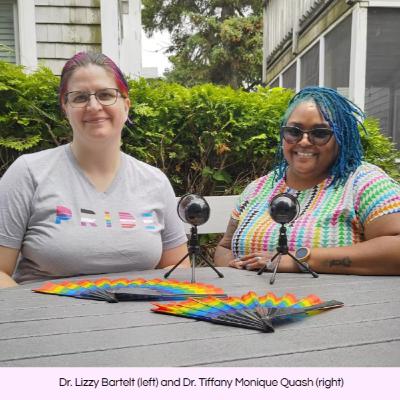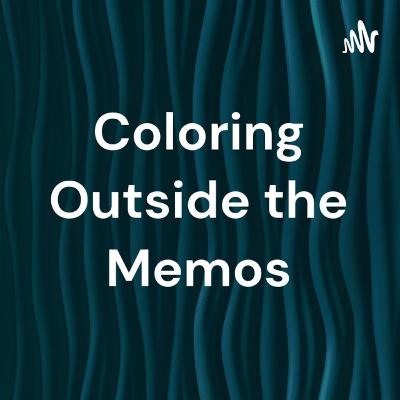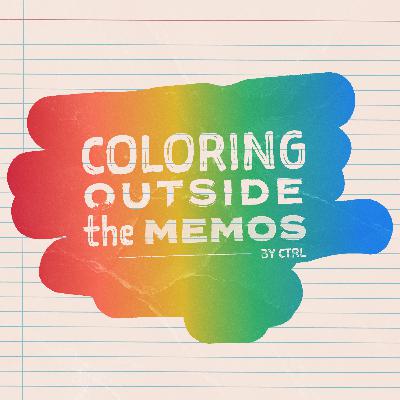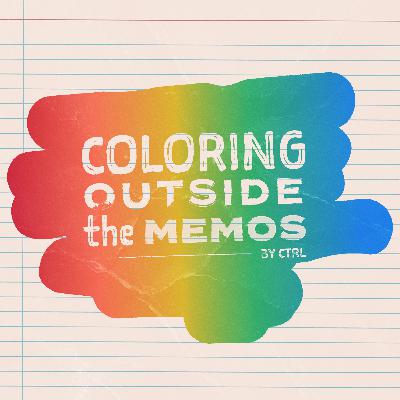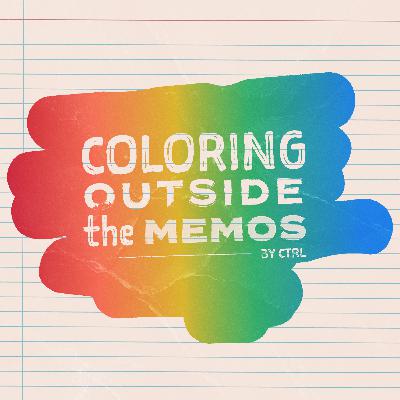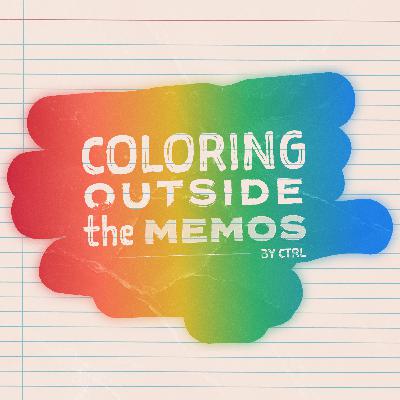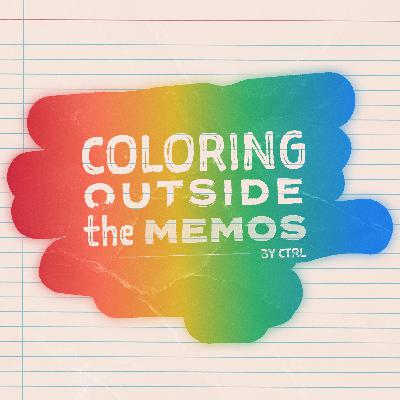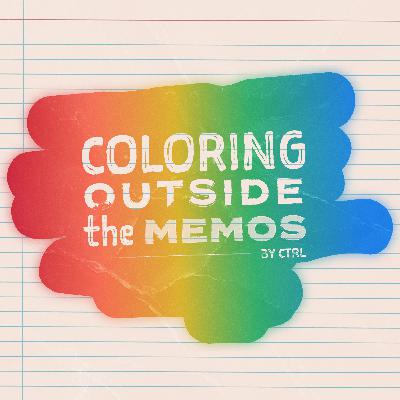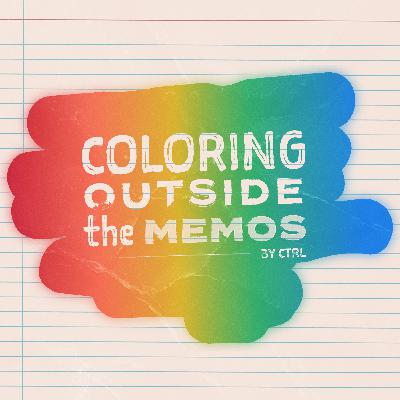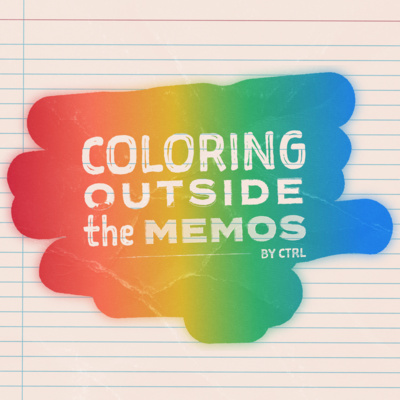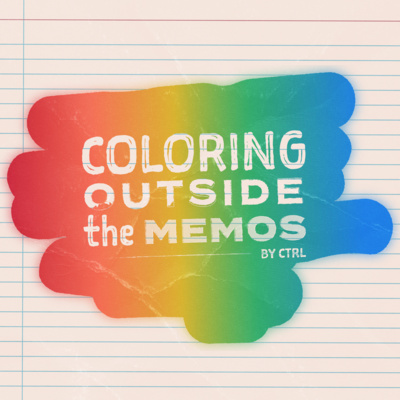Discover Coloring Outside the Memos
Coloring Outside the Memos

Coloring Outside the Memos
Author: Dr. Tiffany Monique Quash and Dr. Lizzy Bartelt
Subscribed: 2Played: 1Subscribe
Share
© Dr. Tiffany Monique Quash and Dr. Lizzy Bartelt
Description
These podcast episodes are an opportunity to have continued conversation about qualitative research, to continue to educate, inform, explore emerging methodologies, heighten existing skills, explore ethical conundrums, and generally understand qualitative research on a deeper level through conversation rather than lecture, workshop, or written work. It is in other words a way to utilize qualitative methodologies in exploring qualitative methodologies.
25 Episodes
Reverse
Email us at cotmpod@gmail.com. Also, check out our website at: https://www.cotmpod.com where we post our updated episodes! In this episode, we will be discussing the how a theoretical framework influences a study guide and the overall study. This conversation will use Professor, Kimberle Crenshaw’s article, “Demarginalizing the Intersection of Race and Sex: A Black Feminist Critique of Theory and Antiracist Politics” as a part of this discussion.
Email us atcotmpod@gmail.com. Also, check out our website at:https://www.cotmpod.com where we post our updated episodes! In this episode, we will be discussing the article “How to Use Artificial Intelligence (AI) as a Resource, Methodological and Analysis Tool in Qualitative Research?” by Prokopis A. Christou from Cyprus University of Technology, Cyprus. Dr. Tiffany and Dr. Lizzy explored the potential benefits and limitations of using AI tools like Chat GPT and GPT in qualitative research, emphasizing the need for transparency, responsibility, and critical thinking. The conversation concluded with a discussion on the potential impact of AI on research and education, with a focus on the importance of maintaining authenticity and human effort in the research process.
Dr. Tiffany and Dr. Lizzy discussed their personal experiences with trauma in their research. Dr.Tiffany shared her experiences with her dissertation and the Black Queer Women study, highlighting the emotional toll of interviewing women who had faced similar challenges. Dr. Lizzy recounted her struggles with coding and analyzing data from a study on sexual assault during sex, and her realization of dissociation during her dissertation on abortion experiences. Both emphasized the importance of self-care and seeking support during research, particularly when dealing with sensitive topics. They also discussed the need for resources and safe spaces for participants and researchers alike.
Email us at cotmpod@gmail.com. Also, check out our website at: https://www.cotmpod.com where we post our updated episodes!
In this episode, Dr. Tiffany and Dr. Lizzy discussed the process of coding in qualitative research. They referred to the book "Thematic Analysis: A Practical Guide" by Virginia Braun and Victoria Clark, emphasizing the importance of starting with a data item and tagging it with a code label.
Dr. Lizzie and Dr. Tiffany discuss transcriptions!
In Episode 20 of "Coloring Outside the Memos," titled "Transcriptions," hosts Dr. Lizzy Bartelt and Dr. Tiffany Monique Quash delve into the intricacies of transcription in qualitative research. They discuss the importance of accurate transcription for data analysis, explore various transcription methods, and share personal experiences to highlight common challenges and best practices. This episode offers valuable insights for researchers aiming to enhance their transcription skills and ensure the integrity of their qualitative data.
In Episode 19 of the podcast, Dr. Tiffany Quash and Dr. Lizzy Bartelt engage in an in-depth discussion on grounded theory, specifically focusing on an article by Harley Turner and Felicity Ashton published in the European Journal of Cardiovascular Nursing. The hosts take a critical look at how the article breaks down the fundamentals of grounded theory, offering practical advice for novice researchers.
Throughout the episode, they explore the intricacies of grounded theory, including how it emphasizes inductive processes and the importance of staying open during the research journey. Dr. Tiffany and Dr. Lizzy critique certain aspects of the article, such as its overuse of jargon and its lack of clarity for beginner researchers. They also highlight useful sections, like a figure that outlines different approaches to literature reviews in grounded theory, but note that the article sometimes assumes too much prior knowledge.
In Episode 18 of "Calling Outside the Memos," Dr. Tiffany Quash and Dr. Lizzy Bartelt discuss a crucial but often overlooked aspect of research: creating flyers for recruitment. They share their personal experiences with flyer design, noting that this skill is rarely taught in graduate programs, yet essential for most research projects. The episode covers various aspects of flyer creation, including the importance of clear messaging, visual appeal, accessibility, and ethical considerations, such as properly crediting photographers and ensuring the flyer communicates the right tone. They emphasize the iterative process of designing an effective flyer and caution against assuming younger research assistants automatically have design skills. Throughout the discussion, they encourage researchers to seek outside help when necessary, such as from graphic designers, and to use resources like Canva for accessible, eye-catching designs.
Dr. Lizzy and Dr. Tiffany address the various types of Qualitative Data Analysis (QDA) tools. Follow us on Twitter @cotm_pod or email us at cotmpod@gmail.com. Also, check out our website at: https://www.cotmpod.com In today’s episode we will be discussing what is Qualitative Data Analysis (big picture), manually coding the data that you gathered, and finally the various types of software you can use for the analysis.
Dr. Lizzy and Dr. Tiffany dive into the art of conducting high-quality research without breaking the bank. Join our hosts as they share practical tips and innovative strategies for maximizing limited resources in the world of academia
Dr. Lizzy and Dr. Tiffany are joined by their mentor, peer, and friend, Dr. Lucia Guerra-Reyes. Dr. Guerra-Reyes is a medical anthropologist and interdisciplinary researcher. She investigates the complexities of access to sexual and reproductive health and care for marginalized communities. Listen to learn more about Dr. Guerra-Reyes approach to qualitative research!
Dr. Lizzy and Dr. Tiffany discuss Decolonizing Ethnography: Undocumented Immigrants and New Directions in Social Science by Alonso Bejarano, Carolina, Juárez, Lucia, Mijangos GarcÃa, Mirian A., Goldstein, Daniel M.
Dr. Lizzy and Dr. Tiffany address the importance of ethics and the challenges that are presented when doing qualitative research. While listening to this episode, keep in mind the process necessary for grants, IRB, and data collection! Follow us on Twitter @cotm_pod or email us at cotmpod@gmail.com
Dr. Lizzy and Dr. Tiffany have their first Book Review discussion! Weapons of Math Destruction by Cathy O’Neil may sound completely quantitative, but take a listen! Follow us on Twitter @cotm_pod or email us at cotmpod@gmail.com
Dr. Lizzy walks us through the importance of working with communities by discussing Community Based Participatory Research (CBPR). Dr. Tiffany and Dr. Lizzy share their experiences with CBPR as either participants or researchers. Dr. Lizzy gives examples of CBPR and gives Dr. Tiffany “the shivers”!
Dr. Lizzy and Dr. Tiffany discuss the positionality statement in this episode. What is it and why should one state their positionality? Most importantly, we will explain and examine how to position ourselves in our work and reclaim academia for ourselves as an academic. Follow us on Twitter @cotm_pod or email us at cotmpod@gmail.com
What is memoing? Why should you memo? How should we use memoing in our work? Dr. Tiffany and Dr. Lizzy take time to discuss the memoing process and how they used memos in past and current research. Let’s get to memoing in this episode!
Have you ever been stuck during your recruitment phase? In this episode, the hosts are asked questions about their recruitment challenges. Their Guest Host for this episode is our favorite producer, Lindsay Studer. We will speak with Dr. Tiffany and Dr. Lizzy about what it was like for them when they were “stuck” and what strategies they used overcome the #RecruitmentChallenges on this episode of #ColoringOustideTheMemos.
Dr. Lizzy and Dr. Tiffany speak with Dr. Shari Watkins about her STEM background, how she came to qualitative research, and how the STEM community and Qualitative Research can come together. The hosts also ask Dr. Watkins about her role with American University’s Center for Teaching, Research, & Learning and her current research. Join this intriguing episode of #ColoringOustideTheMemos.
Dr. Lizzy and Dr. Tiffany are joined by Deana Williams, MPH, Ph.D.
For this week's episode, we will discuss the concept of member checking in qualitative research, emphasizing its significance in enhancing the credibility and trustworthiness of research findings. Member checking involves returning to participants to verify the accuracy and interpretation of the data collected from them. When member checking, we also have to consider how we, as researchers, interact with the communities we are involved in.
Our focus today is focused on the interview guide itself. There are other key moments throughout the research process that are pivotal before, during, and after the construction of the interview guide that includes: IRB protocol, gaining access, transcribing, member checking, etc. Today, we are focusing solely on the interview guide.


